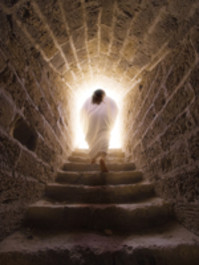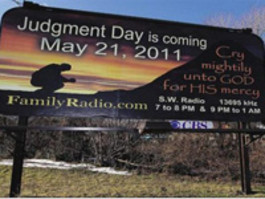“JESUS IS COMING TODAY!” If you’re reading this on May 21, 2011, then that is precisely what the followers of Harold Camping are declaring today—Christ is returning to this earth at 6 p.m. (presumably Pacific Time, since Camping lives in Oakland, California). With his return approximately two per cent of this world’s population will be immediately raptured to heaven, leaving the rest of earth’s inhabitants to be destroyed. In an elaborate theological schematic (which I have purused on-line), Camping predicts the return of Christ on May 21, 2011, and five months later the Judgment Day destruction of earth and the universe on October 21, 2011. Harold Camping, a former civil engineer, is the 89 year old founder of Family Radio—a Christian broadcast network that now includes 66 stations globally. He is not a stranger to apocalyptic predictions, having announced that Christ would return on September 6, 1994. His post-September 6 explanation, as he recently told London’s Independent newspaper, is that “at that time there was a lot of the Bible I had not really researched very carefully. But now we’ve had the chance to do just an enormous amount of additional study and God has given us outstanding proofs that it really is going to happen” (http://www.independent.co.uk/news/world/americas/us-preacher-warns . . . ). Camping has developed an intricate but convoluted system of mathematical calculations that assigns numeric values to biblical themes (redemption, heaven, wrath, judgment, et al), and then multiplies them in order to arrive at time frames. For example, this is from his online paper: “Let us return now to the 722,500.07 days from April 1, 33 A.D. (the day Christ was crucified and died) until May 21, 2011 (the day when God’s salvation plan has been altogether completed and all of the true believers are brought, or raptured into Heaven). The number 722,500 is made up of two sets of identical significant numbers. Each number is intimately related to God’s salvation plan: 5 x 10 x 17 x 5 x 10 x 17 = 722,500. The atonement or redemption demonstrated by Christ’s suffering and death on April 1, 33 A.D. (the number 5) is 100% completed on May 21, 2011 (the number 10) when all the true believers are raptured into Heaven (the number 17)” (http://www.familyradio.com/graphical/literature/tracts/frames/index.html). Based on those “calculations” sincere followers of Camping have erected 2000 billboards and crisscrossed every state of this nation with brightly painted camper vans proclaiming the end of the world today, May 21. But why blog at all about a small apocalyptic movement the secular press has patronizingly dismissed? Here’s why: because while I unequivocally reject Harold Camping’s misguided at best calculations for the end of the world, I must confess to a quiet admiration for the chutzpah of his followers who have risked public ridicule in order to share with the world their deeply held conviction that Jesus is soon to return. I, too, call myself an “adventist” (one who believes in Christ’s soon coming)—what is more, I am a Seventh-day Adventist—but how many of my friends and neighbors have heard me recently testifying to my belief that Jesus is coming soon? Call for a show of hands in worship, and mine quickly shoots up. But ask for a public testimony outside of my congregational comfort zone, and I am strangely silent. Are you the same? What’s wrong with us? Listen to the humbled but still bold Big Fisherman, Peter: “The end of all things is near” (I Peter 4:7). No equivocation there—and he was writing nearly two millennia before our day. “Always be prepared to give an answer to everyone who asks you to give the reason for the hope you have. But do this with gentleness and respect” (3:15). Clearly “hope” is not dependent upon a calculable date for Jesus’ return (who himself declared such calculations futile—Matthew 24:36). Hope rests instead upon the bedrock promise of Christ himself: “Look, I am coming soon!” (Revelation 22:12) And it is that divine and biblical certainty that must compel us who still call ourselves “Adventists.” May 21 will come and go. But taking a page from the play book of Harold Camping’s followers, shall we not—as followers of the soon-coming Christ—determine that what will not come and go is our fervent hope and hope-filled witness for our Savior?
Pastors' Blog
By Pioneer Pastors

A dripping, blood-red X over the face of Osama bin Laden is the cover for the May 20, 2011, issue of TIME. Only four times in its publishing history has the magazine chosen to red-X the face of a notorious human being: Adolf Hitler, Saddam Hussein, Abu Mousab al-Zarqawi and now Osama bin Laden. The press is still abuzz over the stunning surprise and speed with which “the world’s #1 terrorist” was hunted and killed last week. When late on Sunday night President Obama announced bin Laden’s death to the nation and world, jubilant crowds quickly amassed outside the White House and in New York City to celebrate the death of the September 11 mastermind. Seal Team 6 celebrates its precision execution of the raid—Pakistan protests violation of its sovereignty—and earth marvels over the United State’s relentless and finally successful pursuit of its most-wanted nemesis. And how is it with earth’s Christians? As I watched the jubilation of the crowds, read the editorials and followed the unfolding story, the irony of it all occurred to me—we have found reason to rejoice in the death of another. We party because our enemy has been slain. And who would renounce the strong sense of relief family members of the September 11 victims experienced with the news that the perpetrator of that heinous crime had met his own untimely death? “Justice has been done,” was the President’s somber pronouncement. But does God rejoice in the death of Osama bin Laden? King David fled for his life, when his rebel son Absalom lead a coup d'état in Israel to overthrow his father. But days later when the army of the father overpowered the army of the rebel son and Absalom was slain by a commando team, there was no party back at headquarters. Instead the father king wept: “‘O my son Absalom—my son, my son Absalom—if only I had died in your place! O Absalom my son, my son!’” (II Samuel 18:33) On hearing the king’s loud lamenting, Joab—David’s commanding general—burst into the royal chamber with the angry charge that the king’s inconsolable weeping was a disgrace to the nation. But was it? Could it be that David’s weeping was a shadowy representation of another Father King? Will God and the universe party when rebel son and fallen angel Lucifer at last suffers eternal death for his ruthless and unrelenting crimes against the kingdom? Or like David, will the Father of us all bow his head in his hands and weep, “If only I could have died in your place?” Will divine love love its enemies, its nemesis enemy, to the very end? Calvary is answer enough, is it not? “‘Father, forgive them, for they do not know what they do’” (Luke 23:34). And that is why there will be only one death the universe will ever truly rejoice over throughout eternity: “And they sang a new song . . . ‘Worthy is the Lamb who was slain!’” (Revelation 5:9, 12). It is that death, the death of Christ our Savior, that compels us to love even our enemies. Which is why in the end the only dripping, blood-red X that will matter for any of us, for all of us, is the one atop Calvary. “And they sang a new song.”
Did any of you graduates get up at 4 a.m. yesterday to watch the royal nuptials take their vows in Westminster Abbey? The whole world has gone gaga over the wedding of handsome Prince William and lovely Kate Middleton. And I suppose the Nielsen statistics will reveal that a billion-plus people on earth were glued to their televisions to oooh and aaah over this spectacular third millennial version of the ancient fairy tale. (Confession—I was sound asleep—I’ve already married the princess of my dreams!) God bless the queen and the prince and his new bride. But a day later, I’ve got some very good news for you who walk down this aisle to celebrate your own epoch-making tale. Follow the logic of this string of declarations: (1) “God exalted him [Christ] to his own right hand as Prince and Savior” (Acts 5:31); and (2) “Jesus is not ashamed to call [us] brothers and sisters” (Hebrews 2:11 NIV ‘11). And what are “brothers and sisters” of a Prince called? You got it—princes and princesses. Now look, let’s not take this royals craze too far—but you get the point. The God of the universe incarnated himself in our midst for 30 some years, dying as our Savior, and rising again as our Lord and King. Whether you call him Prince and all of us his brothers and sisters, or whether you call him King of kings and all of us his children—the quiet truth still shines bright: In Christ we are children of royalty. So, graduate, live the life of a radical prince and princess. No glitz and glamour for you. You are a child of the Most High King—and the moment your diploma is in hand tomorrow (or a facsimile thereof), you embark upon a divine mission—the fulfillment of the dream God has had for your life from the day you began to breathe. Where will he take you, where will you go? This much I know. Somewhere out there, there is a little Seventh-day Adventist church (maybe not so little) that truly needs your passion, your talents, your eagerness to serve. Please don’t spend the next year wandering from congregation to congregation (or simply deciding that you’re too busy to find life in a local congregation of any interest). In the words of our namesake here at this university, “I know of but one way: Find a field of labor, ask God to help, take off your coat, and pitch into the work” (John Nevins Andrews). And as you do so, remember that there’s a little village pastor back on your alma mater campus that will be cheering you on. God hasn’t brought you this far in life to make you a pauper. You’re royalty, my friend—so go forth and live like the Prince who calls you to follow!

“FEAR FACTOR OPENS NEW MARKET FOR SEEDS” That headline two days ago caught my eye. What in the world do seeds have to do with fear? I read on. “The news is unquestionably frightening: political turmoil at home and abroad; worries over oil, gas, and food prices; earthquakes, tsunamis, nuclear meltdowns . . . And that’s just in the last few months. Marketers are on high alert. Doomsday is nigh! they shout online and on late-night TV as they hype ‘survivalist seed banks’ and ‘apocalypse gardens’ to the nervous and fearful. More than a dozen companies offer deals of up to 94,000 vegetable seeds, stored in tightly sealed buckets and ‘ammo boxes,’ that will feed a family of four for years or decades” (http://articles.philly.com/2011-04-18/news/29443489_1_vegetable-seeds-lettuce-plant-garden). Can you believe it? You can now order 94,000 vegetable seeds to pack away in your basement or bottom drawer in the event of an emergency! Just in case. Are people buying? “‘It’s going well, a little too well right now. We didn’t really anticipate that we’d get busier every time something happens,’ says Dustin Merritt, co-owner of Emergencyseedbank.com in American Fork, Utah.” In fact, Merritt claims that his company is doing as much business now per month as it did in three months last year. Not everybody’s a believer, of course. “If disaster struck, how would anyone be able to even start a garden, let alone keep one going for 10 or 20 years?” And besides, as one master-gardener quipped, “You don’t need to buy thousands of seeds unless you’re going to feed the whole country.” The point? Like the rest of the world, Americans are easily spooked. And the spate of bad news of late has jacked the profits of survivalist sales. But are 94,000 seeds really going to save us? But on this Passion weekend when Christendom relives the explosive story of Jesus’ resurrection 2000 years ago, the juxtaposed ideas of seed and fear may not be as farfetched as we think. For in that garden tomb outside Jerusalem’s walls the divine Seed was buried behind a stone door. Just one Seed. But in that Seed the survivalist hopes of an entire race were pinned. For if that buried Seed were to rise from the earth—alive and eternal—then the survival, the salvation of the human race would be assured, and fear—the endemic reality of life on this rebel planet—would be conquered. And so it was that in the angel’s cry, “He is not here—He is risen!”, the triumph of the Seed and the salvation of the world were pronounced. And so it is that we gather to celebrate the Risen Christ every time we worship! Then ponder the words of the poet, John M. C. Crum, in this paean of praise for our Savior Seed: Now the green blade rises from the buried grain Wheat that in dark earth many days has lain Love lives again, that with the dead has been Love is come again like wheat arising green. In the grave they laid Him, love by hatred slain Thinking that He would never wake again Laid in the earth like grain that sleeps unseen Love is coming again like wheat arising green. Forth He came in triumph, like the risen grain He that for three days in the grave had lain Raised from the dead, my living Lord is seen Love is come again like wheat arising green. When our hearts are wintry, grieving, or in pain Your touch can call us back to life again Fields of our hearts that dead and bare have been Love is coming again like wheat arising green.

A friend of mine sent me a MoveOn.org communiqué. Please don’t judge my friend (or me) by that action! I realize it’s a bit risky even mentioning this national left-of-center organization of political activists. But I’m also going to risk alienating a generation of young activists (which most of “this generation” is—whether left-of-center, right-of-center, middle-of-center, wherever that is) by commenting on the particular cause-response for which this MoveOn.org email is recruiting.
The cause? The just-voted (by the midnight deadline) compromise budget agreement adopted by the House and Senate of the U.S. Congress. Incensed with some of the announced “immoral budget cuts,” MoveOn solicited the popular recording artist, Moby (I had to go online to find out who he was), to record a YouTube piece decrying the government’s abandonment of children, the young, the elderly in favor of corporations and the wealthy. (It’s more of the hackneyed political debate that we’ve become accustomed to in this nation—both sides/parties zealously resorting to over-kill to drive home their agendas.)
But leaving that debate for others, consider for a moment MoveOn’s protest strategy. They are recruiting 30,000 Americans to voluntarily undergo a food fast to show solidarity with the economically disenfranchised in this nation. Give up eating a meal or two, for a day or two, to show the nation’s leaders how concerned you are over the plight of the poor, and the government’s response (or lack, thereof). “30,000 people fasting” is the email’s subject line.
Why talk about this at all? Because what struck me, as I watched the faces of ordinary Americans holding up empty plates with words of protest scribbled onto those plates, was the question: What if we—the young and old in the church—felt as deeply about the spiritual poverty and spiritual starvation of our nation, our world, our civilization? How willing would we be to fast from food—not to move Congress, but to plead with the God of the universe to give us his heart for the starving and then give us the courage to become missionaries for him to America, to the world, to every soul we know hungry for the Bread of Life?
How serious is the famine of spiritual starvation? “‘Behold, the days are coming,’ says the Lord GOD, ‘that I will send a famine on the land, not a famine of bread, nor a thirst for water, but of hearing the words of the LORD. They shall wander from sea to sea, and from north to east; they shall run to and fro, seeking the word of the LORD, but shall not find it’” (Amos 8:11, 12). The prophet declares that one day there will be no Bread of Life left for the starving—civilization as we know it will implode upon itself.
But that day is not here yet. There still is time to take Christ, the only satisfying Bread of Life (John 6:35), to this starving generation. We must never fast from that Bread. But perhaps we, too, might do well to fast from our daily bread and pray, in order to seek the mind of God for the part he would have us play in his endtime “spiritual famine relief.” Once you have the Bread for yourself, there’s no telling where the Spirit will send you in order for you to share it. Move on, indeed! Because there is a hunger no government on earth will ever be able to satisfy. And because if we don’t, people will starve to death. So what will be your next move?
On March 22, bbc.com released a story that has set the blogosphere abuzz. The headline reads: “Religion may become extinct in nine nations, study says” (http://www.bbc.co.uk/news/science-environment-12811197). Before examining that list of nine countries, here’s the logic behind that conclusion. The American Physical Society (APS), meeting in Dallas recently, released research based on non-linear dynamics, a mathematical model used to analyze data. Examining religious affiliation census data extending back a century for numerous countries, and then correlating that data with known social motives behind being religious or not, the APS concluded that for these nine nations the trends indicate that eventually social motivation for joining a religion will diminish until (mathematically speaking) no one in the country will be religious. “‘The idea is pretty simple,’ said Richard Wiener of the Research Corporation for Science Advancement, and the University of Arizona. ‘It posits that social groups that have more members are going to be more attractive to join . . . For example in languages, there can be greater utility or status in speaking Spanish instead of [the dying language] Quechuan in Peru, and similarly there's some kind of status or utility in being a member of a religion or not.’” The reality that more and more people in these particular nations “are identifying themselves as non-affiliated with religion,” Wiener pointed out, led to this study’s conclusion. In what nine countries is religion predicted to become extinct? Australia, Austria, Canada, the Czech Republic, Finland, Ireland, the Netherlands, New Zealand, and Switzerland. In the Netherlands 40% of those surveyed declare themselves non-affiliated with religion—in the Czech Republic that figure climbs to 60%. And what about the United States? Commenting on the BBC report, theblaze.com indicates that nationwide 15% of Americans now claim no religion, making them the only religious group “growing in all 50 states.” Obviously, no mathematical formula or theory exists that can accurately predict the spiritual realities of the collective human heart. And yet two millennia ago Jesus himself wondered about the spiritual state of humanity just before he returned to earth: “When the Son of Man comes, will he find faith on the earth?” (Luke 18:8). Will he? Though Dylan Thomas was not decrying the loss of faith on the earth, his fiery admonition might serve the friends of Christ well, we who must yet move into the gathering darkness to share the promise of light:
Do not go gentle into that good night. Rage, rage against the dying of the light.
“Rage” is hardly an irenic term—but it can depict the fiery passion of the Spirit against the gathering nightfall of faith, can’t it? Yes, the numbers of the non-affiliated are on the rise in nations once considered Christian. But No, the friends of the Son of Man need not “go gentle” into the approaching night. Rather, let the Radicals, this new generation of missionaries, rise up with the fervor of Christ himself and move into these nine nations (and many more) with the faith of the Savior bright in our own hearts and fresh on our own lips. Rather than simply raging “against the dying of the light,” is it not better to light a candle in the dark instead? After all the night belongs to Christ. And it may yet be that with our candles high the Son of Man will find faith on the earth when he comes.

The western media have begun to banter about the suggestion that this winter’s political upheaval in the Middle East is like a spring thaw, warming heretofore rigid dictatorial or monarchical governments into pliable, receptive fields for democracy. The “Arab Spring” they call it. First Tunisia and Egypt—now Bahrain, Yemen, Syria, Jordan and possibly Libya. Is it an Arab Spring, a new opportunity and season for the will of the people? Allah akbar! (“God is good!”) is their cry. But nobody is calling the calamity that descended upon Japan three weeks ago a “Japanese Spring.” While it’s true their famous cherry blossoms have begun to flower up and down that crippled nation, the immensity of their earthquake-tsunami cataclysm has only been compounded by the nuclear hemorrhaging at their Fukushima power plant. Will there be a “springtime” in Japan’s future? Given their dogged industriousness and national determination (Gambari masho! [“Let’s take courage together!”] is the historic Japanese cry in the face of a massive challenge) it is hard to imagine otherwise. But then again, maybe in Heaven’s perspective, it isn’t an Arab Spring or a Japanese Spring. Could it be that in God’s eyes we are poised upon an “Earth Spring”—an entire civilization simultaneously being brought to an historic openness to Christ and the everlasting gospel before he returns? On this International Student Sabbath here at Andrews University, could it be that the operative cry of Holy Scripture is this passionate appeal of God: “‘Look to Me, and be saved, all you ends of the earth! For I am God, and there is no other” (Isaiah 45:22). And if this is an Earth Spring, then wouldn’t this be the unprecedented season in earth history for the mobilization of an entire generation of Seventh-day Adventist young. New, bold, radical missionaries “into all the world” for the Kingdom of God. The Radicals. There never will come a season when they are not God’s most strategic endgame, will there? Are you still mentally debating whether or not God has called you personally to “go into all the world” for him? You watched as 283 others made that commitment a few Sabbaths ago. But you’re still not sure God means you? Here are two suggestions for dealing with your inner struggle: (1) find someone you trust to talk to and pray with—sometimes a listening ear and a wise heart are just what you’re needing to come to a personal decision; and (2), put your finger on Isaiah 45:22 and ask God how he would have you help him fulfill his passion for a saved world. If your heart is open to God and willing to follow wherever he leads, then you needn’t fear that he’ll leave you hanging in limbo indefinitely. Sometimes the very struggle is a part of Christ’s strengthening your own commitment. Who knows—this may turn out to be your own “Spring,” too.

"O God, Japan!" The 9.0 magnitude earthquake and thirty-foot tsunami that decimated northeastern Japan’s coastal cities (just as spring break began here on campus) is not only the sixth strongest quake on global record, but is also the most costly natural disaster in earth’s history. However, it is the human toll that has broken our collective heart. Born to missionary parents in Tokyo and having spent the first 14 years of my life in the Land of the Rising Sun, I have felt the anguish of displaced Japanese who from afar have wept over the numbing television and computer screen images streaming out of the devastation. Haven’t you cried, too? How can we not, when this land of stalwart, industrious, orderly, polite and gracious almost to a fault people collectively cry out to their gods—to anyone who will listen, really—their unabashed pain and sorrow? In California last week with my mother, I stared at the black and white front page newspaper photograph of a Japanese woman sobbing over the lifeless hand of her mother, protruding from the tsunami wreckage of what was once their home. Doesn’t God weep with those who do? What can we do, we who returned rested from our break to face the glory and joys of a new springtime across this campus? We must do something, mustn’t we—if we would not fall victim to what psychologists describe as “frozen emotions,” deep feelings prompted by television images, but never acted upon? You may give on two fronts. ADRA International (the Adventist Development and Relief Agency, now headed by our own Rudi Maier) has mobilized its disaster response team in Japan to the crisis centers. ADRA Japan is coordinating its relief efforts in evacuation centers with the Japanese Department of Social Services. You can make your gift, as I did, at www.adra.org. Just click onto the “Japan Quake” banner when it appears and follow the simple directions. If you prefer to talk with an ADRA representative, you may call 1-800-424-ADRA. A second front of this disaster is the damage sustained by our church in Japan. If you would like to contribute to the church’s rebuilding efforts, you may send your gift to the North American Division of Seventh-day Adventists electronically at https://appeal.nadadventist.org/Japan, or you may make your check payable to: North American Division, Attn: 2011 Japanese Earthquake/Tsunami Fund, 12501 Old Columbia Pike, Silver Spring, MD 20904. But there is a third way we must all respond. It is the simple prayer, “O God, Japan!” One hundred-sixteen million people—who celebrate births and marriages with a Shinto priest (the unique Japanese religion of animism, praying to the spirits of the deceased) and who are buried by a Buddhist priest, but who are otherwise secular and without religion or faith—surely the Savior of this world longs to breakthrough to this people where only one half of 1% are Christians. “O God, Japan!” Won’t you join me in claiming this promise for the Land of the Rising Sun? “But to you who fear My name the Sun of Righteousness shall arise with healing in His wings” (Malachi 4:2). Isn’t that incredible? Could it become a prophecy that one day the Land of the Rising Sun will truly become that—the land upon which the Sun of Righteousness will shine down his healing grace and saving power? “O God, Japan!” We must pray. And we must go.
Whatever possessed a rich, well-to-do man like Zacchaeus to climb a tree just to get a glimpse of Jesus? Today’s sermon, based on the Bible story found in Luke 19:1-10, spins a tale of the way it might have been.
Come with me as we travel to the backside of the Roman Empire, into the sweltering, fly-infested land of Palestine. We continue our track across difficult terrain until we reach the fragrant field city of Jericho. Here is the home of the despised man, Zacchaeus, a tax collector.
Today we will join Zacchaeus on a tax–collecting trip. Our goal will be to answer this question: What was it that made Zacchaeus throw embarrassment, shame, and ridicule all to the wind, to do something as uncharacteristic as climbing up a tree and crawling right out onto the limb -- for all to see?

Several months ago someone sent me the 1577 prayer of “England’s most famous sailor and explorer,” Sir Francis Drake. A quick check of Wikipedia revealed that this swash-buckling privateer (a private ship owner authorized by the government to prey on foreign vessels during a time of war) was never a candidate for Anglican sainthood. Nevertheless his circumnavigation of the world on his vessel The Golden Hind remains one of history’s great records.
But it is his prayer—found in his ship’s diary and composed on the eve of one of his grand ventures—that I find particularly moving, especially on this Sabbath when our pulpit series, “The Radicals,” comes to its conclusion. It seems the right prayer for “this generation” called by God to spiritually conquer every continent and nation of this world for his kingdom.
So brood with me over the prayer—and let your heart be stirred by the intrepid Spirit of Christ himself, who is calling you and me to sail the seas on his behalf for this generation that desperately needs him.
The Prayer of Francis Drake
Disturb us, Lord, when
We are too pleased with ourselves,
When our dreams have come true
Because we dreamed too little,
When we arrived safely
Because we sailed too close to the shore.
Disturb us, Lord, when
with the abundance of things we possess
We have lost our thirst
For the waters of life;
Having fallen in love with life,
We have ceased to dream of eternity
And in our efforts to build a new earth,
We have allowed our vision
Of the new Heaven to dim.
Disturb us, Lord, to dare more boldly,
To venture on wilder seas
Where storms will show Your mastery;
Where losing sight of land,
We shall find the stars.
We ask you to push back
The horizons of our hopes;
And to push back the future
In strength, courage, hope, and love.
http://www.worshipcentral.org/blog/worshipcentral/al-gordon/sir-francis-drakes-prayer
- ‹ previous
- 44 of 62
- next ›
